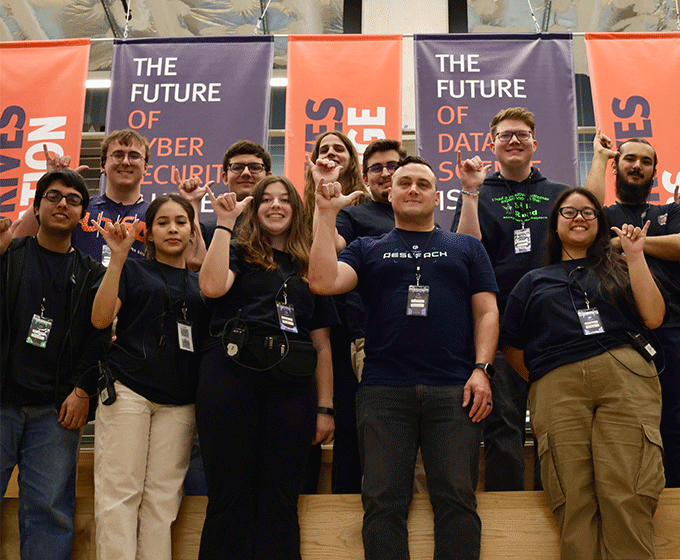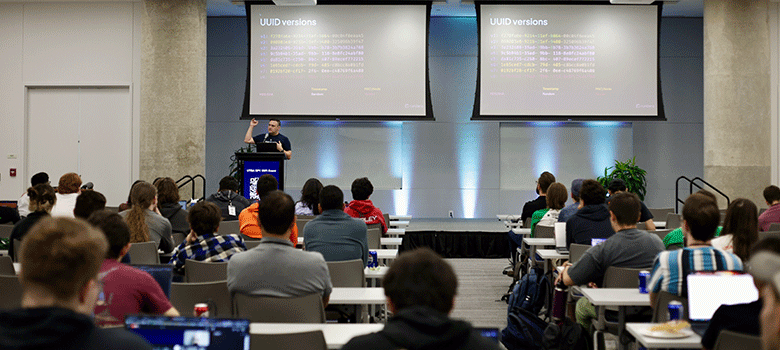
NOVEMBER 25, 2024 — After a three-year hiatus, RowdyCon — the first student-led cybersecurity conference at UTSA — made a successful return, attracting students eager to deepen their understanding of the field. Held earlier this month at the School of Data Science, the event was revived by a new generation of students who offered an engaging lineup of speakers, workshops and competitions.
RowdyCon 2020 took place in December, at the height of the COVID-19 pandemic, as a one-time virtual event. This year, the 12-hour conference returned in person, free for all local college and university students while also offering a virtual component. This allowed participants who preferred to join remotely to watch key speeches online.
“RowdyCon 2020 was the first of its kind,” said Julian Peña, a junior computer science major at UTSA and competition and workshop lead for RowdyCon 2024. “So while all of the original organizers have graduated, we decided to bring it back this year.”
Staying true to its roots, the conference offered a mix of guest speakers, practical workshops and activities designed to test participants’ skills. The lineup included challenges like “capture the flag,” where students competed to solve cybersecurity puzzles and “king of the hill,” which had teams defending their systems while trying to infiltrate others.
“There was so much to do, and every moment was filled with opportunities to learn,” Peña added. “It was anything but dull.”

RowdyCon 2024 offered a mix of guest speakers, practical workshops and activities designed to test participants’ skills.
Workshops highlighted practical skills such as malware analysis, digital forensics and the exploitation of security vulnerabilities. Maggie Heaphy, a master’s student in information technology and the marketing director for the conference, emphasized the unique opportunities offered.
“We put on some really cool content that gave students hands-on experience,” Heaphy said.
The conference also featured an industrial control systems simulation run by UTSA’s Cyber Jedis. This simulation mimicked a cyber-attack on critical infrastructure, demonstrating how real-world consequences differ from typical computer system breaches.
“This type of technology runs our country and not a whole lot of people know how to protect this infrastructure because it’s different from your normal laptops and computers at home,” Peña said. “We wanted to have a testbed that simulates this infrastructure so students could see how devastating it could be when a cyberattack affects more than just a computer system but things in the real world.”
Accessibility remained a central theme, with the conference designed to cater to a range of skill levels. Workshops were geared for everyone from beginners to experienced students, and participation was encouraged for all.
“This was a student-focused cybersecurity conference,” Peña said. “We wanted it to be very approachable, with something for everyone. Whether people were just getting started or had been at it for a while, we had challenges to make sure they learned something. That was our ultimate goal.”
The event served as a networking opportunity, featuring talks from industry leaders and an address by H.D. Moore, creator of the widely used security testing software Metasploit. It offered students a chance to make connections that could be valuable for their future career.
“It’s kind of a small world,” Peña said. “It’s very likely that someone you met at RowdyCon is somebody you might end up working with in the future, so it’s a really, really good way to engage with the local community.”
Local cybersecurity organizations participated by hosting tables, providing students with opportunities to network and make valuable connections.
“I know a few local companies that wanted to do community outreach, and RowdyCon was a great way for them to get their name out there while interacting with students,” Heaphy said. “Students were able to network and share their résumés, creating a valuable bridge between the two that will hopefully continue to grow.”
Peña, Heaphy, and the rest of their team are hopeful that RowdyCon will continue in the future. Despite facing their share of challenges bringing the conference back together, the group is proud of what they’ve achieved and optimistic that the event resonated with students and will become popular enough to occur regularly.
“We’re hoping that everyone liked what we brought to the Rowdy Conference,” Peña said. “Next year, they’ll want to come back because they enjoyed this years’ experience, had a lot of fun and gained a lot of knowledge.”
UTSA Today is produced by University Communications and Marketing, the official news source of The University of Texas at San Antonio. Send your feedback to news@utsa.edu. Keep up-to-date on UTSA news by visiting UTSA Today. Connect with UTSA online at Facebook, Twitter, Youtube and Instagram.
After getting your student settled in their room, connect with other UTSA families at our Family Get Together. Attendees need to RSVP for the event.
Rock & Brews Restaurant - 5702 Landmark Pkwy, San Antonio, TX 78249Late Night at the Rec is an awesome UTSA tradition that turns a typical information session into an exciting night of fun. It's a unique opportunity to meet new people and reconnect with old friends.
Campus RecreationCheer on the UTSA Soccer team as they take on Lamar in the first home game of the season.
Park West FieldShow your UTSA pride with our spirited crew—Rowdy, Cheer, the Spirits of the Roadrunner, and the incredible Spirit of San Antonio Marching Band (SOSA)—as we light up the night in true Roadrunner style.
Main Campus East Lawn, Main CampusAnnual Giving will host a First Day of School celebration to welcome students back to campus. We will have giveaways and photo opportunities.
Sombrilla Plaza, Main CampusEnjoy snacks while connecting with Adobe reps and student ambassadors. Download or log into the Adobe Express app to snag swag and unlock exclusive back-to-school templates. It’s a fun, fast way to get creative and start the school year with bold moves.
Central Plaza, Main CampusCelebrate the merger of UTSA and UT Health San Antonio with a pop-up featuring free t-shirts, exclusive swag, and interactive photo opportunities. Open to all students, faculty and staff. Supplies are limited!
Sombrilla Plaza, Main CampusThe University of Texas at San Antonio is dedicated to the advancement of knowledge through research and discovery, teaching and learning, community engagement and public service. As an institution of access and excellence, UTSA embraces multicultural traditions and serves as a center for intellectual and creative resources as well as a catalyst for socioeconomic development and the commercialization of intellectual property - for Texas, the nation and the world.
To be a premier public research university, providing access to educational excellence and preparing citizen leaders for the global environment.
We encourage an environment of dialogue and discovery, where integrity, excellence, respect, collaboration and innovation are fostered.